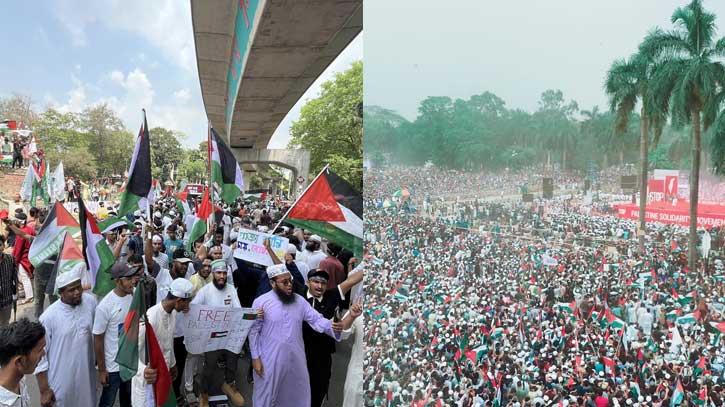On April 12, 2025, the heart of Dhaka witnessed an extraordinary public demonstration as thousands of people gathered at Suhrawardy Udyan for a powerful solidarity rally titled “March for Gaza.” Organized by the Palestine Solidarity Movement, in Bangladesh, the event became a defining moment in the country’s ongoing support for the Palestinian people.
Amid the worsening humanitarian catastrophe in Gaza due to Israeli military aggression, the rally was not only an emotional outcry but also a structured political message. Citizens from all walks of life — students, scholars, religious leaders, political activists, and ordinary people — stood together in unwavering solidarity with Palestine. Palestinian flags waved high, slogans filled the air, and the crowd held signs condemning the genocide and calling for global accountability.
At the center of the rally was the public reading of a detailed Proclamation and Pledge — a comprehensive document directed toward the United Nations, Muslim leaders, the Bangladeshi government, and the general public. The language of the proclamation was deeply spiritual, moral, and urgent, presenting a multilayered response to the ongoing atrocities in Gaza.
The proclamation opened with an invocation: “We begin in the name of Allah, Who is Almighty, Who establishes justice, Who stands with the oppressed, and determines the fate of the oppressors.” This spiritual foundation set the tone for a bold and unapologetic document divided into four main sections, each targeting a specific audience with clearly articulated demands.
Demands to the United Nations and the International Community
In this section, the proclamation criticized the international community’s failure to prevent or stop the genocide in Gaza. It strongly condemned Western nations that supply weapons and diplomatic backing to Israel. The document then presented five urgent demands:
-
The trial of Zionist Israel’s genocide must be ensured in the International Court.
-
Not ceasefire—effective and collective measures must be taken to stop the genocide.
-
Obligation must be created to return lands to pre-1967 boundaries.
-
East Jerusalem must be internationally recognized as the capital of the Palestinian state.
-
The path for Palestinians’ self-determination, security, and state sovereignty must be opened.
Demands to the Leaders of the Muslim Ummah
This section highlighted the moral and religious responsibility of Muslim-majority nations to take a unified stance against the occupation. The proclamation emphasized that Gaza is not just a geographical issue, but a matter of Islamic identity and collective failure. The following five demands were made to the governments and organizations of the Muslim world:
-
All economic, military, and diplomatic relations with Israel must be immediately severed.
-
Commercial embargoes and sanctions must be imposed against the Zionist state.
-
Must stand with comprehensive support for the oppressed people of Gaza including medical, food, housing, and defence assistance.
-
Must initiate active diplomatic campaigns to isolate Israel internationally.
-
The OIC and Muslim states must take strong protests and effective diplomatic positions against the deprivation of Muslims’ rights under India’s Hindutva rule, especially against state aggression such as interference in Waqf law.
Demands to the Government of Bangladesh
The third part addressed Bangladesh’s role, both as a Muslim-majority country and a state built on the principles of justice and resistance to oppression. The document emphasized that silence from the government would be viewed as contempt toward public sentiment. The six demands presented are as follows:
-
The ‘Except Israel’ condition must be reinstated on Bangladeshi passports and the position of not recognizing Israel as a state must be expressed more clearly.
-
All agreements made by the government with any Israeli institutions must be canceled.
-
Effective measures must be taken to send aid and medical assistance to Gaza at the state level.
-
Instructions to boycott products of Zionist companies must be issued in all government institutions and import policies.
-
State-level protests must be made against the ongoing persecution of Muslims and other minorities under India’s Hindutva government, as Hindutva today is not just a local ideology—but a major servant of the international Zionist bloc.
-
Al-Aqsa, Palestine, and the struggle history of Muslims must be included in textbooks and education policy—so that future Muslim generations grow up with knowledge of their history, heritage, and identity.
A Pledge to Ourselves and Future Generations
The final section was a heartfelt pledge made by the people themselves. It called on individuals, families, and communities to rise above silence and self-forgetfulness and to prepare the next generation for the long-term defense of Islamic values and Palestinian freedom. The pledges included:
-
We will spontaneously boycott—every product, company, and power that sustains Israel’s occupation.
-
We will prepare our society and future generations—who will preserve and restore all symbols and signs of Islam and the Muslim Ummah, Insha Allah.
-
We will raise our children in such a way—that they will be ready for the highest sacrifice of life and wealth to protect their ideals and land.
-
We will not be divided—because we know, it does not take long to occupy a divided people. We will remain united, so that this Bangladesh never becomes the next Gaza of any Hindutva project.
The proclamation concluded with prayers and salutes to the martyrs and resilient people of Gaza, referring to them as bearers of faith, patience, and sacrifice. It called for unity among the Ummah and declared Gaza not as a tragedy to be mourned alone, but as a mirror of resistance and a rallying point for global Muslim awakening.
This rally and its proclamation represent not just a national cry for justice but a document of historical significance, articulating the demands and hopes of a people deeply engaged in the cause of Palestine. The March for Gaza in Dhaka was more than a political protest—it was a collective moral awakening.

